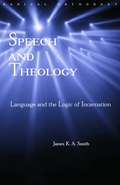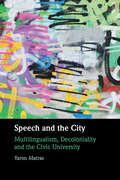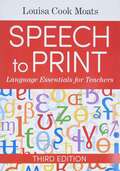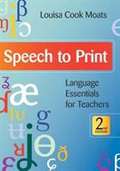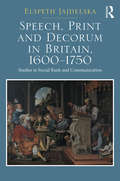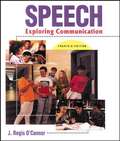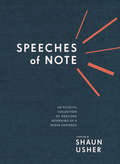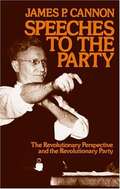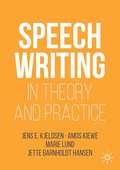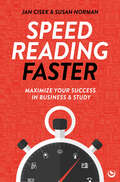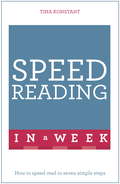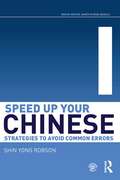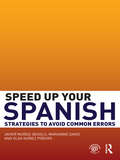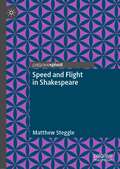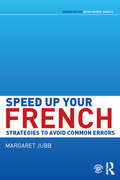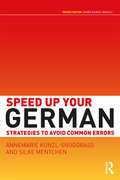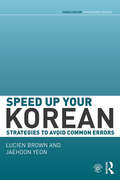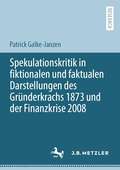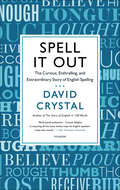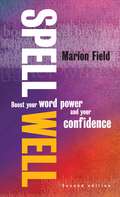- Table View
- List View
Speech and Theology: Language and the Logic of Incarnation (Routledge Radical Orthodoxy)
by James K.A. SmithGod is infinite, but language finite; thus speech would seem to condemn Him to finitude. In speaking of God, would the theologian violate divine transcendence by reducing God to immanence, or choose, rather, to remain silent? At stake in this argument is a core problem of the conditions of divine revelation. How, in terms of language and the limitations of human understanding, can transcendence ever be made known? Does its very appearance not undermine its transcendence, its condition of unknowability?Speech and Theology posits that the paradigm for the encounter between the material and the divine, or the immanent and transcendent, is found in the Incarnation: God's voluntary self-immersion in the human world as an expression of His love for His creation. By this key act of grace, hinged upon Christs condescension to human finitude, philosophy acquires the means not simply to speak of perfection, which is to speak theologically, but to bridge the gap between word and thing in general sense.
Speech and the City: Multilingualism, Decoloniality and the Civic University
by Yaron MatrasThe Brexit debate has been accompanied by a rise in hostile attitudes to multilingualism. However, cities can provide an important counter-weight to political polarisation by forging civic identities that embrace diversity. In this timely book, Yaron Matras describes the emergence of a city language narrative that embraces and celebrates multilingualism and helps forge a civic identity. He critiques linguaphobic discourses at a national level that regard multilingualism as deficient citizenship. Drawing on his research in Manchester, he examines the 'multilingual utopia', looking at multilingual spaces across sectors in the city that support access, heritage, skills and celebration. The book explores the tensions between decolonial approaches that inspire activism for social justice and equality, and the neoliberal enterprise that appropriates diversity for reputational and profitability purposes, prompting critical reflection on calls for civic university engagement. It is essential reading for anyone concerned about ways to protect cultural pluralism in our society.
Speech for Effective Communication
by Rudolph F. VerderberSpeech For Effective Communication is divided into 6 units, which are further divided into 22 chapters. Unit 1, containing Chapters 1-5, presents basic speech communication skills. Chapter 1 introduces the field of speech communication. Chapters 2 and 3 acquaint you with the concepts of verbal and nonverbal communication. Chapter 4 covers the vocalization process, and Chapter 5 introduces listening skills. Unit 2, containing Chapters 6-8, presents interpersonal communication skills, including making introductions, giving and receiving directions, using the telephone, engaging in conversations, and taking part in job and college interviews. Unit 3, containing Chapters 9-13, presents public speaking skills. Chapters 9-11 cover speech preparation skills; Chapter 12 discusses diction and effective word choice; and Chapter 13 introduces methods and skills for delivering speeches. Unit 4, containing Chapters 14-16, applies the information presented in Unit 3 to the development of three basic kinds of speeches: informative speech, process speech, and persuasive speech. Unit 5, containing Chapters 17-19, presents group communication skills. Chapter 17 covers group discussion; Chapter 18 introduces debate; and Chapter 19 discusses parliamentary procedure. Unit 6, containing Chapters 20-22, presents the performing arts, including oral interpretation, theater, and radio and television. Following these chapters are an appendix of speeches, a glossary of vocabulary terms, and the index.
Speech for Today
by Brian Ashbaugh Beka HortonGood speech habits have a direct connection with success—success in school, in conversations and discussions, and in presentations. Knowing how to speak well may make the difference between success and failure. This handbook in speech training presents the art of everyday speech in a friendly, conversational style that you and your high schooler will love. Your teen will learn the fine points of giving a personal testimony and a devotional. He may even discover performance talent as he studies monologue, poetry interpretation, and storytelling. Many speaking exercises and selections for interpretation provide opportunities for practice and performance. Grades 11–12.
Speech to Print: Language Essentials for Teachers
by Louisa Cook MoatsFor two decades, Speech to Print has been a bestselling, widely adopted textbook on explicit, high-quality literacy instruction. Now the anticipated third edition is here, fully updated with ten years of new research, a complete package of supporting materials, and expanded guidance on the how of assessment and instruction in today's classrooms. <p><p>Filling a critical gap in teacher preparation courses, Speech to Print supplies K-12 educators with in-depth knowledge of the structure and function of language—fundamentals they need to deliver successful structured literacy instruction. Renowned literacy expert Louisa Cook Moats gives current and future teachers comprehensive, accurate, and accessible information on the underpinnings of language instruction, including: <p>•The history of the English language and its effect on spelling English phonology, including speech sounds and their distinctive features <p>•How print represents speech in English <p>•The morphological aspects of words <p>•Syntax and its instruction <p>•How meaning is conveyed with language <p><p>Through case studies, activities, recommended teaching principles, and close analysis of real-world student work samples, teachers will also receive invaluable insight into how their students should be taught. Ideal for use in preservice courses and in-service professional development sessions, this essential textbook will give educators the strong foundation they need to teach language and reading skills to students with and without disabilities.
Speech to Print: Language Essentials for Teachers
by Louisa MoatsOne of the most popular and influential reading textbooks of the past 10 years gets a comprehensive update in this highly anticipated second edition, straight from renowned NCTQ-recommended expert Louisa Moats. Updated meticulously with the very latest research, the new edition of this bestselling text helps elementary educators grasp the structure of written and spoken English, understand how children learn to read, and apply this foundational knowledge as they deliver explicit, high-quality literacy instruction. <P><P>With extensive updates and enhancements to every chapter, the new edition of Speech to Print fully prepares today's literacy educators to teach students with or without disabilities.
Speech, Print and Decorum in Britain, 1600--1750: Studies in Social Rank and Communication
by Elspeth JajdelskaFilling an important gap in the history of print and reading, Elspeth Jajdelska offers a new account of the changing relationship between speech, rank and writing from 1600 to 1750. Jajdelska draws on anthropological findings to shed light on the different ways that speech was understood to relate to writing across the period, bringing together status and speech, literary and verbal decorum, readership, the material text and performance. Jajdelska's ambitious array of sources includes letters, diaries, paratexts and genres from cookery books to philosophical discourses. She looks at authors ranging from John Donne to Jonathan Swift, alongside the writings of anonymous merchants, apothecaries and romance authors. Jajdelska argues that Renaissance readers were likely to approach written and printed documents less as utterances in their own right and more as representations of past speech or as scripts for future speech. In the latter part of the seventeenth century, however, some readers were treating books as proxies for the author's speech, rather than as representations of it. These adjustments in the way speech and print were understood had implications for changes in decorum as the inhibitions placed on lower-ranking authors in the Renaissance gave way to increasingly open social networks at the start of the eighteenth century. As a result, authors from the lower ranks could now publish on topics formerly reserved for the more privileged. While this apparently egalitarian development did not result in imagined communities that transcended class, readers of all ranks did encounter new models of reading and writing and were empowered to engage legitimately in the gentlemanly criticism that had once been the reserve of the cultural elites. Shortlisted for the European Society for the Study of English (ESSE) book prize 2018
Speech: Exploring Communication (4th edition)
by J. Regis O'ConnorSpeech: Exploring Communication was developed to build on existing skills in an "explain" and "do" approach. Every topic in speech is comprehensively covered and all lessons have been carefully developed to ensure student success.
Speeches of Note: An Eclectic Collection of Orations Deserving of a Wider Audience
by Shaun UsherFrom the author of the New York Times bestseller Letters of Note comes a collection of 75 of history's most interesting, profound, and sometimes unknown speeches from a range of scintillating personalities such as Frederick Douglass, Justin Trudeau, Albert Einstein, Meghan Markle, Barbara Jordan, and Ursula K. Le Guin. This thoughtfully curated and richly illustrated collection celebrates oratory old and new, highlighting speeches we know and admire, while also shining a light on profound drafts that were never delivered or have until now been forgotten. From George Bernard Shaw's warm and rousing toast to Albert Einstein in 1930 and the commencement address affectionately given to graduates at Long Island University by Kermit the Frog, to the chilling public announcement (that was thankfully never made) by President Richard Nixon should Neil Armstrong and Buzz Aldrin become stranded on the moon, Speeches of Note honors the words and ideas of some of history’s most provocative and inspiring personages.
Speeches to the Party: The Revolutionary Perspective and the Revolutionary Party
by James P. Cannon Al HansenWriting in the early 1950s, Cannon discusses how a proletarian party can resist the conservatizing pressures of the emerging capitalist expansion and anticommunist witch-hunt. He discusses Washington's failure to achieve its goals in the Korean War, why the rulers reined in McCarthyism, and how class-conscious workers under these conditions carried out effective union work and political activity to build a communist workers party. Includes: Notes, Appendices, Introduction
Speechwriting in Theory and Practice (Rhetoric, Politics and Society)
by Jens E. Kjeldsen Amos Kiewe Marie Lund Jette Barnholdt Hansen (Deceased)This book provides students, researchers, and practitioners of speechwriting with a unique insight in the theory, history, and practice of speechwriting. The combination of theory and practice with case studies from the United States and Europe makes this volume the first of its kind. The book offers an overview of the existing research and theory, analysing how speeches are written in political and public life, and paying attention to three central subjects of contemporary speechwriting: convincing characterization of the speaker, writing for the ear, and appealing with words to the eye. Chapters address the ethics and the functions of speechwriting in contemporary society and also deliver general instructions for the speechwriting process. This book is recommended reading for professional speechwriters wishing to expand their knowledge of the rhetorical and theoretical underpinnings of speechwriting, and enables students and aspiring speechwriters to gain an understanding of speechwriting as a profession.
Speechwriting in Theory and Practice (Rhetoric, Politics and Society)
by Jens E. Kjeldsen Amos Kiewe Marie Lund Jette Barnholdt HansenThis book provides students, researchers, and practitioners of speechwriting with a unique insight in the theory, history, and practice of speechwriting. The combination of theory and practice with case studies from the United States and Europe makes this volume the first of its kind. The book offers an overview of the existing research and theory, analysing how speeches are written in political and public life, and paying attention to three central subjects of contemporary speechwriting: convincing characterization of the speaker, writing for the ear, and appealing with words to the eye. Chapters address the ethics and the functions of speechwriting in contemporary society and also deliver general instructions for the speechwriting process. This book is recommended reading for professional speechwriters wishing to expand their knowledge of the rhetorical and theoretical underpinnings of speechwriting, and enables students and aspiring speechwriters to gain an understanding of speechwriting as a profession.
Speed Reading Faster: Maximize Your Success in Business & Study
by Jan Cisek Susan NormanThe ultimate guide to reading faster and smarter. Perfect for students, professionals and avid readers, this easy-to-follow guide will not only improve your reading speed, but also your retention, concentration and comprehension. Pick up proven techniques and shortcuts to make speed reading simple, effective and effortless, such as how to: • identify key information• read in meaningful chunks• open your peripheral vision• move your eyes in patterns• and much more!With practical exercises, articles and quizzes to help you apply this knowledge immediately, Speed Reading Faster makes it easy to be successful with less effort – to become a smarter, faster and more productive reader.
Speed Reading In A Week: How To Speed Read In Seven Simple Steps (Teach Yourself In A Week Ser.)
by Tina KonstantSpeed Reading In A Week is a simple and straightforward speed reading course, giving you everything you need to know in just seven short chapters. From increasing your reading rate and effective memory techniques, to overcoming distractions so that you can read in any environment and developing a reading programme to make it second nature, you'll eventually wonder how you ever read any other way. This book introduces you to the main themes and ideas of speed reading, giving you a basic knowledge and understanding of the key concepts, together with practical and thought-provoking exercises. Whether you choose to read it in a week or in a single sitting, Speed Reading In A Week is your fastest route to success:- Sunday: The five-step system- Monday: Speed reading- Tuesday: Remember what you read- Wednesday: Your eyes and effective reading- Thursday: Distractions and solutions- Friday: Reading different types of material for different reasons- Saturday: What next?ABOUT THE SERIESIn A Week books are for managers, leaders, and business executives who want to succeed at work. From negotiating and content marketing to finance and social media, the In A Week series covers the business topics that really matter and that will help you make a difference today. Written in straightforward English, each book is structured as a seven-day course so that with just a little work each day, you will quickly master the subject. In a fast-changing world, this series enables readers not just to get up to speed, but to get ahead.
Speed Up Your Chinese: Strategies to Avoid Common Errors
by Shin Yong RobsonSpeed up your Chinese is a unique and innovative resource that identifies and explains the common errors that English-speaking learners of Chinese repeatedly make. The book brings together these common errors to offer a valuable insight into the differences between English and Chinese and to reveal the inner workings of the latter allowing students to enhance their understanding and mastery of the Chinese language. Key features: organizes basic principles of Mandarin grammar into coherent categories. learner-oriented and problem-solving approach analysis approximately 150 commonly made errors. highlights and explains differences between Mandarin and English mnemonic devises provide vital learning strategies exercises with full answer key to reinforce learning examples in traditional characters provided in the appendix. Speed up your Chinese is the ideal reference for all learners of Chinese.
Speed Up Your Spanish: Strategies to Avoid Common Errors
by Javier Muñoz-Basols Marianne David Olga Núñez Piñeiro‘Excellent book. The chapters put together and systematise a lot of material that is often taught in an anecdotal or haphazard sort of way, if at all. Students will learn a great deal from the book and have their confidence in using Spanish considerably boosted as a result.’ – Jonathan Thacker, Merton College, University of Oxford, UK ‘An invaluable, highly original and methodically sound approach to correcting and eliminating common, yet difficult-to-eliminate errors.’ – Manuel Delgado, Bucknell University, USA ‘The user-friendly format and page layout makes Speed Up Your Spanish a highly practical reference source for students and teachers.’– Ma Victoria García Serrano, University of Pennsylvania, USA False friends, idiomatic expressions, gender and capitalization are just some of the areas that cause confusion for students of Spanish. Learning how to avoid the common errors that arise repeatedly in these areas is an essential step for successful language learning. Speed Up Your Spanish is a unique and innovative resource that identifies and explains such errors, thereby enabling students of Spanish to learn from their mistakes while enhancing their understanding of the Spanish language. Each of the nine chapters focuses on a grammatical category where English speakers typically make mistakes in Spanish. Each chapter is divided into sections that classify the concepts and errors into subcategories. Full explanations are provided throughout with clear, comprehensive examples and exercises to help the learner gain an in-depth understanding of Spanish grammar and usage. Key features: carefully selected grammar topics and examples based on the most commonly made errors exercises throughout to reinforce learning shortcuts and mnemonic devices providing vital learning strategies a Companion Website available at www.speedupyourspanish.com providing supplementary exercises as well as audio files. Suitable both for classroom use or self-study, Speed Up Your Spanish is the ideal resource for all intermediate learners of Spanish wishing to refine their language skills. Javier Muñoz-Basols is an Instructor in Spanish at the University of Oxford. Marianne David teaches Spanish at the Trinity School in New York. Olga Núñez Piñeiro is Senior Lecturer in Spanish at the University of Westminster.
Speed and Flight in Shakespeare
by Matthew SteggleShakespeare's plays are fascinated by the problems of speed and flight. They are repeatedly interested in humans, spirits, and objects that move very fast; become airborne; and in some cases even travel into space. In Speed and Flight in Shakespeare, the first study of any kind on the subject, Steggle looks at how Shakespeare’s language explores ideas of speed and flight, and what theatrical resources his plays use to represent these states. Shakespeare has, this book argues, an aesthetic of speed and flight. Featuring chapters on The Comedy of Errors, A Midsummer Night’s Dream, Romeo and Juliet, Henry V, Macbeth and The Tempest, this study opens up a new field around the ‘historical phenomenology’ of early modern speed.
Speed up your Arabic: Strategies to Avoid Common Errors
by Sebastian MaiselPronunciation, spelling, the concept of roots and patterns and idomatic phrases are just some of the areas that cause confusion for students of Arabic. Learning how to avoid the common errors that arise repeatedly in these areas is an essential step in successful language learning. Speed Up Your Arabic is a unique and innovative resource that identifies and explains the most commonly made errors, enabling students to learn from their mistakes and enhance their understanding of the Arabic language. Each of the nine chapters focuses on a grammatical category where English speakers typically make mistakes in Arabic. Each chapter is divided into sections that classify the concepts and errors into subcategories. Full explanations are provided throughout with clear, comprehensive examples and exercises to help the learner gain an in-depth understanding of Arabic grammar and usage. Key features: Carefully selected grammar topics and examples based on the most commonly made errors Comprehensive explanations of the most difficult grammar points help learners gain an in-depth understanding of Arabic grammar and usage. Exercises throughout reinforce learning and link theory to practice A complete answer key making it ideal for self-study A glossary of grammatical terms, an Arabic-English glossary and a bibliography to aid learning Useful drills and listening samples available for free download at http://www.routledge.com/books/details/9780415660556/ Suitable both for classroom use or self-study, Speed Up Your Arabic is the ideal resource for all intermediate learners of Arabic wishing to refine their language skills.
Speed up your French: Strategies to Avoid Common Errors (Speed Up Your Language Skills Ser.)
by Margaret JubbSpeed up your French is a unique and innovative resource that identifies and explains the errors most commonly made by students of French. From false friends to idiomatic expressions and the use of prepositions, each of the nine chapters focuses on an aspect of the language where English speakers typically make mistakes. Full explanations are provided throughout with clear, comprehensive examples, enabling students to acquire a surer grasp of French vocabulary and idiom, as well as grammar. Key Features: carefully selected grammar topics and examples based on the most commonly made errors extensive exercises and answer key to reinforce learning, link theory to practice and promote self-study use of mnemonic devices, including visual illustrations, to aid understanding Supplementary exercises and answer key available at www.routledge.com/cw/Jubb Suitable both for classroom use or self-study, Speed up your French is the ideal resource for all intermediate learners of French wishing to refine their language skills.
Speed up your German: Strategies to Avoid Common Errors
by Silke Mentchen Annemarie Kunzl-SnodgrassSpeed Up Your German is a unique and innovative resource that identifies and explains the errors most commonly made by learners of German, enabling students to learn from their mistakes while enhancing their understanding of the German language. Each of the eighteen chapters focuses on a grammatical category where English speakers typically make mistakes. Each chapter is subdivided into two levels: Level 1 explains the root cause of the error while level 2 goes deeper into the grammar allowing students to choose the level they want to work at. Each point is clearly explained and exemplified and a range of exercises reinforce learning. Suitable both for classroom use or self-study, Speed Up Your German is the ideal resource for all intermediate learners of German wishing to refine their language skills.
Speed up your Korean: Strategies to Avoid Common Errors
by Jaehoon Yeon Lucien BrownWord order, honorifics, terms of addresses and idiomatic expressions are just some of the areas that cause confusion for students of Korean. Learning how to avoid the common errors that arise repeatedly in these areas is an essential step in successful language learning. Speed Up Your Korean is a unique and innovative resource that identifies and explains these errors, enabling students to learn from their mistakes while enhancing their understanding of the Korean language. Key features: Carefully selected grammar topics and examples based on the most commonly made errors Comprehensive explanations of the most difficult grammar points help learners gain an in-depth understanding of Korean grammar and usage. Exercises throughout reinforce learning and link theory to practice Suitable both for classroom use or self-study, Speed Up Your Korean is the ideal resource for all intermediate learners of Korean wishing to refine their language skills.
Spekulationskritik in fiktionalen und faktualen Darstellungen des Gründerkrachs 1873 und der Finanzkrise 2008
by Patrick Galke-JanzenMit der Analyse fiktionaler Darstellungen, genauer Erzählungen, der Finanzkrise 2008 und des Gründerkrachs 1873 leistet die vorliegende Arbeit einen Beitrag zur Literarischen Ökonomik, indem sie untersucht, ob und wie Finanzkrisenromane ökonomisches Wissen ihrer Zeit produktiv aufnehmen und andererseits mögliches eigenes Wissen als Fundus für ihre Leser bereitstellen. Patrick Galke-Janzen zeigt, dass der Spekulant und die Spekulation für zahlreiche literarische Reflexionen Anlass gibt und man geradezu von einem eigenen fiktionalen Spekulationsdiskurs ausgehen muss, der im deutschsprachigen Raum vor allem betont, welche Gefahren der überkommenen Ordnung und der als realistische Warenökonomie verstandenen Volkswirtschaft durch Spekulation und Spekulanten drohen. Erzählungen über den Gründerkrach und die Finanzkrise 2008 fordern implizit und explizit zu einer Entscheidung über den Stellenwert und die soziale Praxis ökonomischer Spekulation auf und schließen dabei an einen diachronen Diskurs über die Gefährdung des Sozialen durch ökonomische Spekulation an.
Spell It Out: The Curious, Enthralling, and Extraordinary Story of English Spelling
by David CrystalThe fascinating and surprising history of English spelling from David Crystal, everyone's favorite expert logophileWith The Story of English in 100 Words, David Crystal took us on a tour through the history of our language. Now, with Spell It Out, he takes on the task of answering all the questions about how we spell: "Why is English spelling so difficult?" Or "Why are good spellers so proud of their achievement that when they see a misspelling they condemn the writer as sloppy, lazy, or uneducated?" In thirty-seven short, engaging and informative chapters, Crystal takes readers on a history of English spelling, starting with the Roman missionaries' sixth century introduction of the Roman alphabet and ending with where the language might be going. He looks individually at each letter in the alphabet and its origins. He considers the question of vowels and how people developed a way to tell whether or not it was long or short. He looks at influences from other cultures, and explains how English speakers understood that the "o" in "hopping" was a short vowel, rather than the long vowel of "hoping". If you've ever asked yourself questions like "Why do the words "their", "there" and "they're" sound alike, but mean very different things?" or "How can we tell the difference between "charge" the verb and "charge" the noun?" David Crystal's Spell It Out will spell it all out for you.
Spell Well, 2nd Edition: Boost Your Word Power And Your Confidence
by Marion FieldIt is true. A well-written letter is taken far more seriously than one using misspelt words. Research shows that people automatically assume you're more intelligent, and they'll take notice of you in a way they never did before. Now, with the help of this book you can discover the power of words for yourself. There are checklists and steps that ensure you'll soon be writing with much greater confidence.Contents: 1. Identifying different sounds; 2. Checking capital letters; 3. Forming plurals and changing verbs; 4. Using prefixes, suffixes and hyphens; 5. Sorting out the changes; 6. Avoiding common mistakes; 7. Using apostrophes and abbreviations; 8. Revising chapters 1-7; 9. Exploring the dictionary; 10. Discovering the thesaurus; 11. Enhancing your writing; 12. Looking at American spelling; 13. Exploring new words, jargon and slang.
Spell Well, 2nd Edition: Boost your word power and your confidence
by Marion FieldIt is true. A well-written letter is taken far more seriously than one using misspelt words. Research shows that people automatically assume you're more intelligent, and they'll take notice of you in a way they never did before. Now, with the help of this book you can discover the power of words for yourself. There are checklists and steps that ensure you'll soon be writing with much greater confidence.Contents: 1. Identifying different sounds; 2. Checking capital letters; 3. Forming plurals and changing verbs; 4. Using prefixes, suffixes and hyphens; 5. Sorting out the changes; 6. Avoiding common mistakes; 7. Using apostrophes and abbreviations; 8. Revising chapters 1-7; 9. Exploring the dictionary; 10. Discovering the thesaurus; 11. Enhancing your writing; 12. Looking at American spelling; 13. Exploring new words, jargon and slang.
